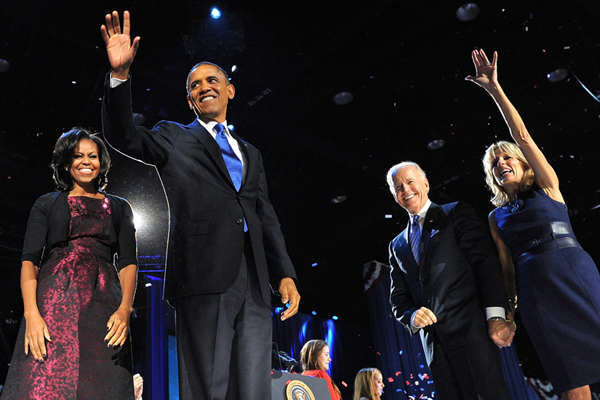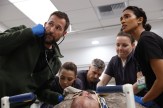Election 2012: all-day analysis

A day after the nation went to the polls, we’re talking to Northeastern faculty members about President Barack Obama’s electoral win over Republican Mitt Romney, which came despite an extremely close popular vote count. Check in throughout the day to see what experts from across the university are saying about what the results mean for the nation and the world.
2:40 p.m.: Denise Horn, an assistant professor of international affairs, said President Obama has been well-received around the world because his foreign policy approach, spearheaded by Secretary of State Hillary Clinton, has focused on fostering support from allies rather than taking the kind interventionist approach associated with George W. Bush’s presidency and which Mitt Romney had indicated he would likely support as president.
Leadership works when you’re making sure people want to follow you. You don’t get that from being belligerent or aggressive; you get that from showing a willingness and an openness to work with other people. Europe is going through really hard time right now and the last thing they need is the United States telling them what to do. They need partnership, not dictatorship, and if we’re going to succeed going forward in places like Syria we’re going to need good collaboration with our allies and organizations like NATO.
Much of Obama’s success, Horn said, can be tied to Hillary Clinton’s leadership running the State Department, a post has indicated she may soon step down from after 4 years.
I think she is a superb diplomat. She’s very good at reaching across the table and building support for American initiatives. People at the State Department feel empowered by her and feel like they’re able to push the U.S. agenda in a very positive way. President Obama is viewed very positively in the world and I think a lot of that has to do with the world of Hillary Clinton.
1 p.m.: Terry Fulmer, the dean of the Bouvé College of Health Sciences, said Obama’s election provides some stability when it comes to implementing the Affordable Care Act, which Mitt Romney had pledged to repeal. For Bouvé, there is an ongoing increased push for training primary care providers, who play a key role in Obama’s health care reforms.
We will really be thinking about how to accelerate things like our physician assistant and nurse practitioner programs, which ensure that more people can get the primary care coverage they need. We have to think about the people who didn’t have insurance but now do and are able to work with their primary care physician to reach their goals. And it’s exciting that the Affordable Care Act places a central role on community health clinics, which provide more culturally sensitive care because people are getting care and attention from people who are in their own community.
12:35 p.m.: Bill Crotty, the Thomas P. O’Neill Chair in Public Life, said while Obama has proven himself as an excellent campaigner, he has not been able to translate those skills over to governance.
He is a tremendous campaigner: He’s smart, he works very hard, he knows what to do. As a political leader, though, those qualities have yet to become evident. In dealing with Congress and developing an issues-based agenda, I’m just not seeing it. I think President Obama spent the last your years preparing for this election and because of that has not laid out a very significant policy program. And now he is going back to a Washington that is very much the same, with structural problems that will again prevent very little from getting done.
Crotty also noted that the gracious, bipartisan tone Romney struck during his concession speech — rather different from the one he took for most of the race — would have served him well in this year’s campaign.
Romney was clearly caught off guard by the result, but I was really impressed by his concession speech and its focus on bipartisanship. I think if he had stuck with that the whole time, there would be a good chance he’d have been elected president.
We he did was stop being a moderate Republican and instead turned into a representative of the core Republican base, which I think was very unfortunate for him. I think if Romney stayed a moderate throughout this election, he really could have won this. Now, I don’t see any Republican like that on the horizon.
11:50 a.m.: Michael Dukakis, a Distinguished Professor of Political Science and the former Massachusetts governor who was the Democratic nominee for president in 1988, said candidates like Barack Obama and Massachusetts Senator-elect Elizabeth Warren were able to win in tight races thanks to the strength of coordinated grassroots operations.
Obama and Warren won for one reason: There was a ground game! Why more people don’t get this, I don’t know. It’s not rocket science, although some of the newer technologies certainly make things easier and more effective. It’s about blocking and tackling, it’s about making sure your precinct captains and volunteers are out there making contact with people on a personal basis — and doing it more than once. If you want to win these days, this kind of operation is the only way to beat big money. You’re not going to match guys like Karl Rove, who can spend millions of dollars on TV ads, but you can beat them on the ground.
The nation’s demographics are also shifting, putting the current Republican Party at more and more of a disadvantage each year, Dukakis said. “In 20 years, the whole country is going to look like California,” he said, describing the diverse West Coast state that has voted for Democratic presidential candidates since Bill Clinton was elected in 1992. “And Democrats need to take advantage of that, starting right now, if they want to take back the House in 2014.”
11:30 a.m.: Alan Schroeder, a professor of journalism, said this morning that media coverage leading up to Obama’s re-election was largely split, with the more conservative outlets pushing back on hard data from places like Nate Silver’s 538 blog that largely predicted the election’s outcome.
There was a big split in the ideological media. There was a whole different narrative on Fox News and the right-wing blogs indicating that Romney would win and Obama would get creamed in this election. Obviously that did not happen. All of these predictions were being made in the face of the evidence, because the poll results were certainly not saying that. That was certainly strange: that you had such a different reaction to the information from the conservative media and just how wrong they were.
As the technology gets better and as the ability to predict gets more precise, a lot of the political coverage will be data-driven as opposed to instinctual. That is a big change and I think Nate silver — who took a lot of crap over the last few weeks, mostly by people on the right who were unhappy with his model — has been vindicated. That kind of emotional analysis is nowhere near as reliable as the data analysis that people like Silver have put forward. I think it means that political reporting in particular will have to become more about concrete evidence and less about gut instincts.
Schroeder also pointed out that while Hurricane Sandy and its aftermath did not appear to sway many voters, who as in 2008 cited the economy as their top concern, it did disrupt campaign narratives.
I think the hurricane added this odd sort of factor in the final days here because it really took the campaign off the table for about a week at a really critical point. So that was different — certainly one of those unexpected events that campaigns cannot possibly prepare for. It made some difference, I think, because it had Obama on the news every night, being presidential, doing the job of president. That, I think, was a contributed to his success.
9:20 a.m.: Wendy Parmet, an associate dean in the School of Law and a leading expert on health, disability and public health law, said the Obama’s re-election eliminates much of the uncertainty surrounding the Affordable Care Act.
We know now that the Affordable Care Act will go forward; it will be implemented and that’s going to be hard to change. A lot of questions, though, still remain. Critical questions remain on the table, one being the fiscal cliff and what if anything that will mean for Medicare and Medicaid. There are some very big decisions now for the states, some very crucial decisions: They have a very short time now to decide if they’re going to set up their own insurance exchanges; many of them have so far been holding back. Probably the most important part, though, is the Medicaid expansion, which is very crucial to covering a large number of the uninsured.
And Parmet said that Obama may be able to shift the balance of the right-leaning Supreme Court over the course of his second term.
It’s very likely that the president will have one or two appointments over the next four years. Depending on who those justices are, he may be able to change the dynamics on the court. What is clear, I think, is that the court will not go further to the right. We have a very conservative Supreme Court right now and in most matters there is a five member conservative majority — we’ve seen that in a lot of cases, most notably being Citizens United. This is a far more conservative court than we’ve had in a long time. If Romney had won it could have gone further to the right, or it would at least have cemented that.
8:45 a.m.: Journalism assistant professor Dan Kennedy said last night’s relatively early call for Obama indicates that news networks may finally have recovered from the hangover that followed the 2000 election, when Florida was called first for Al Gore and then George W. Bush before the race was deemed “too close to call.”
In recent years it seems they wanted to wait until long after they actually could make a call. In previous years networks seem to have been afraid of making calls while people were still waiting to vote in certain states, which has just gone away and I think that’s great – it was a terrible approach. And this year they were making the calls much earlier, and they definitely didn’t get anything wrong.
I think this year the networks were probably just a lot more confident with their numbers and their modeling, so they were able to make these calls much earlier than in previous years. And certainly we wouldn’t be hearing the end of it if any of them were wrong, which clearly they weren’t.
8:25 a.m.: Political science professor Robert Gilbert, who spoke to News@Northeastern editor Greg St. Martin last night, cautioned that Obama’s re-election will not mean things will get easier in Washington, but noted the night was a big one for Democrats.
It was a good day for Democrats. Not only did they keep the presidency, they also kept the Senate. I really think the Republicans thought they’d win, and I thought Mitt Romney was telling the truth when he said he hadn’t prepared a concession speech.
8:15 a.m.: Greg Goodale, a communication studies associate professor whose work focuses largely on political rhetoric and public speaking, said poor optics and audio took away from a gracious Mitt Romney, whose concession speech was more bipartisan than most of his campaign for the presidency. In his victory speech, Goodale said, Barack Obama displayed more energy and spirit than we have seen in years, something he attributed to the grassroots nature of his campaign.
There has been a complaint from Democrats that he has lacked passion, which we saw in his convention speech, where he was dull, and in that first debate, where he just didn’t even seem engaged. I think a lot of people were worried he had lost the passion, the fire in his belly. I think, for the first time since maybe even 2007, we saw that man, who was able to reach across the aisle and work on some major issues.
Goodale also pointed out that young voters made up a larger share of the electorate than they did in any previous year, including 2008. That’s a good sign for future political engagement:
That’s significant because it means a lot of people are going to be engaged and a lot of people are going to get involved, and I think that is going to become a message that is going to stick and inspire a next generation. As a professor, that’s something I look for in my students: I want to see them get involved and be engaged, no matter where they stand politically. That’s something Obama mentioned when he spoke to voters who didn’t support him this year. He didn’t care who you voted for, but was glad you voted because that was good for America.
7:52 a.m.: Question 2, an initiative that allows for terminally ill patients to choose to end their lives, appears to be headed for defeat. Before the election, we asked Terry Fulmer, dean of the Bouvé College of Health Sciences and a leading expert in the field of geriatric care, to explain why the issue is becoming a prominent topic of debate across the United States:
All people grieve individually and there’s no set path for human grieving – it’s a very personal and very individual process. We don’t have a lot of science, but we do have cases from states that have these laws and, in some cases, people say that it provided a little more control over the end of their life. Family communication and talking about individual rights is important. There is incredible distress that goes with losing a loved one.
We have a lot more research that we need to conduct in this area. As a society we need to prepare for the aging of America. In 1900 life expectancy was about 40 years old, and now we’ve almost doubled it to 80 years old. That life expectancy brings with it chronic diseases and disorders, and family care issues that weren’t there earlier.
Massachusetts voters did however vote to approve Question 3, which legalizes the use of medicinal marijuana. Leo Beletsky, an associate professor with appointments in Bouvé and the School of Law, said before the election that while scientific evidence of the drug’s medical benefits are limited, public support has gradually shifted in its favor.
Public opinion has gradually shifted to support marijuana liberalization in general and medical marijuana in particular: national public opinion figures put support for medical access upwards of 70%, while overall support for legalization recently gained majority support. Polls of Massachusetts voters reflect similar sentiments. With marijuana access laws on the books in more than a third of US states, I believe we are moving towards a different approach to regulation of this drug — one that better reflects its risks and benefits when compared to other socially-accepted substances like alcohol, nicotine, and prescription medications.
7:45 a.m.: Where did the campaigns get their cash? David Lazar, an associate professor of computer and information science and political science, visualized contribution data within the greater Boston area for VisPolitics, which applies network science to politics.
Click here for more News@Northeastern coverage of Election 2012. And go to 20 West Village F from 6 to 8 tonight to hear faculty from the School of Public Policy and Urban Affairs analyze election results alongside Mass. Speaker of the House Robert DeLeo, BA ’72, Newton Mayor Setti Warren and State Sen. Sonia Chang-Diaz, part of the weekly Open Classroom series.




